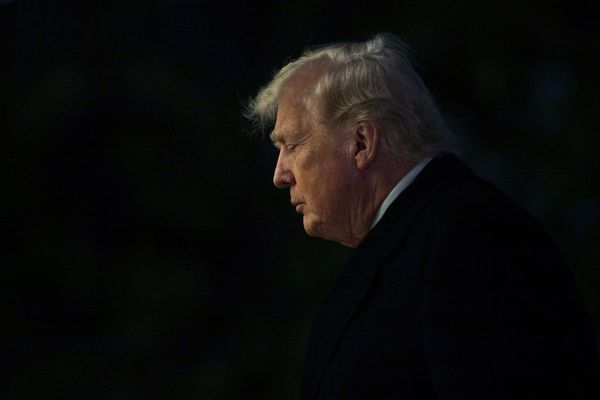For Jimmy Lai, Hong Kong symbolised freedom. Arriving in the city as a stowaway on a fishing boat at age 12, he went on to find work in a garment factory before building a fortune as a successful businessman and founding the popular pro-democracy newspaper, Apple Daily.
Now, after nearly five years in prison following Beijing’s imposition of a draconian national security law, Lai’s spirit may not have been broken, but the 77-year-old British citizen and publisher is in poor health, and the risk of his dying in prison, in the place that once represented liberty, is real. If he does, Britain’s shameful inaction will mean it is in part responsible.
As Lai’s show trial resumes with closing arguments, he is in the dock again on trumped-up national security charges. The outcome, however, is likely to be a foregone conclusion, with Hong Kong officials having previously lauded a 100 per cent conviction rate in such cases.
Attempts by Keir Starmer and previous British governments to secure his release have been feeble. The UK must redouble its efforts before it is too late.
Not only does the UK need to make Lai’s case the centre of any discussions with China, in international fora or during bilateral talks, but any normalisation of the relationship with China must be conditional on his immediate release and return to the UK.
Other governments place much higher priority on the release of wrongfully detained citizens abroad, and the UK’s weak response on Lai, as on other cases such as Egyptian-British writer Alaa Abd el-Fattah, underscores the need for the Labour government to deliver on its promise to appoint a special envoy to help secure the release of British nationals arbitrarily detained overseas.
The Committee to Protect Journalists (CPJ), the global press freedom group that I lead, was among more than 30 organisations that wrote to Starmer in June, urging him to swiftly meet with Lai’s son, Sebastien – a request that the family has been making for over two years and which remains unfulfilled to this day. This is simply unacceptable from a country whose citizen is being wrongfully held abroad – and one which, as the UK does, purports to champion rights like press freedom.
If Lai, a British citizen, can’t get full-throated support and relentless commitment from his government, what hope might I or anyone else who stands up for the rights on which the UK is founded have if a foreign power wrongfully arrests us?
Once one of Hong Kong’s best-known tycoons, Lai’s life has changed dramatically. Held in a maximum-security prison, Lai, who has diabetes, routinely spends over 23 hours a day in solitary confinement, with only 50 minutes for restricted exercise and limited access to daylight. A UN working group determined his detention to be arbitrary and unlawful.
The prime minister rightfully told parliament last October that Lai’s case was a “priority” and called for his release. But the government has taken no practical steps to bring this about.
This is not just about the prospect of an elderly British citizen, a grandfather, dying in a foreign prison. Lai’s continued detention – and the UK’s failure to make its relationship with China contingent on his freedom – is harmful both to democracy and to Britain’s prosperity.
China is one of the UK’s largest trading partners, and the steady deterioration of Hong Kong’s traditionally strong rule of law, which had set it apart from mainland China, could come to present a serious risk to British businesses in the territory. The interests of UK businesses cannot be safeguarded in the case of disputes in a country where laws are abused and misused to suit those in power.
Our experience at CPJ tells us that autocratic regimes never stop with the persecution of journalists. Indeed, restrictions on journalists are among the first indicators of greater repression to follow. Lai’s detention has been followed by a severe deterioration not just in press freedom, but in wider liberties.
In the five years since Hong Kong’s national security law was enacted, journalists have been arrested, jailed, and threatened, while dozens of other media outlets have shut, relocated, or downsized their operations in Hong Kong. News outlets are seen to be self-censoring in a place once considered a bastion of press freedom in Asia. All this has occurred despite the supposed protections that exist under Hong Kong Basic Law, its mini-constitution put in place after Britain handed the city back to China in 1997.
Lai is in prison for his journalism and support for democracy. He chose to stay put in Hong Kong despite knowing the risks of being arrested. “A captain can’t jump ship. You may save your life, but you will live in hell,” he said in an interview in 2020.
Now, as Britain’s captain, Starmer must do the right thing – and bring Lai home.
Jodie Ginsberg is CEO of the Committee to Protect Journalists
With the Putin-Trump plan, Ukraine has a choice – of sorts
What does Europe’s ‘Z-Team’ hope to get from its Trump showdown?
After an inconclusive summit, Ukraine’s fate hangs in the balance
Zelensky returns to Washington, this time with Europe at his side
Raising flags only divides communities – just ask Northern Ireland
I’m 23 and single – why are so many men looking for women my mother’s age?







